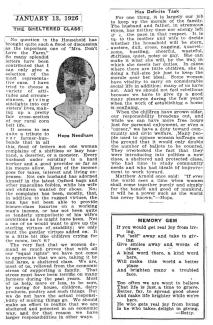No question in the Household has brought quite such a flood of discussion as the important one of "Mrs. Don't Love the Farm." So many splendid letters have been contributed that I can only give a selection of the most representative ones. I have tried to choose a variety of attitudes and circumstances, giving sidelights into our sisters' lives, making up a pretty fair cross-section of our rural corn belt life.
It seems to me quite a tribute to our farmer-husband that in all this flood of letters not one woman complains of a shiftless or lazy husband, a deserter, or a monster. Every husband under scrutiny is a hard worker and a good provider so far as his means allow. Most of the income goes for taxes, interest and living expenses. Not one husband has adorned himself in the latest Oxford bags and other masculine foibles, while his wife and children wanted for shoes. No, the complaint has been, mostly, that in addition to the rugged virtues, the man has not been able to provide leisure-class luxuries on a working man's income, or has not been quite so tenderly sympathetic of his wife's ambitions as he might have been. Not a one of use would want to give up the sterling virtues of stability; we only want the gentler virtues added on. It is a little bit like children crying for the moon, isn't it?
The very fact that we women demand so much proves that with all our "equal rights" we have not come to appreciate that we are, taking it by and large, a sheltered class. We are, most of us, relieved from the economic stress of supporting a family. That stress myst have been terrific on many farmers during the past years. Most of us help, more or less, to be sure, by caring for house, children, dairy products, poultry and such things. But we do not have the actual responsibility of making things go. We should make an effort to realize that we are sheltered and protected in an economic way, and for that reason we have larger responsibilities in other ways.
Has Definite Task
For one thing, it is largely our job to keep up the morale of the family. The husband and father, in strenuous times, has neither time nor energy left . It is up to the mother and wife to decide whether the household will be stern, austere, dull, cross, nagging, quarrelsome, bustling, cheerful, wasteful, shiftless, quiet, noisy or gay. She can make it what she will, by the way in which she meets her duties. In cases where there are little children, she is doing a full-size job just to keep the morale near her ideal. Some women have vitality to carry on considerable social life in addition; many of us have not. And we should not feel rebellious because we have to give up a good many pleasures during the few years when the work of establishing a home is config.
When the children have grown older, our responsibility broadens out, and while we can have more free hours just for personal enjoyment, or even a "career," we have a duty toward community and civic welfare. Many people used to oppose woman suffrage on the ground that it would only double the number of ballots to be counted. They overlooked the fact that they were introducing into politics a new class, a sheltered and protected class, who had time to study community needs and who had ideals of improvement to work toward.
Matthew Arnold once said: "If ever the world sees a time when women shall come together purely and simply for the benefit and good of mankind, it will be a power such as the world has never known." --Hope
Memory Gem
If you would get real joy from living
Put "self" away and take to giving,
Give smiles away and words of cheer,
A kind word there, a kind word here,
Will make this world a better place
And brighten many a troubled face.Too often we are won't to believe
That life is just a time to grieve.
Better, far, to spread good cheer
And make life brighter while we're here.
He who gets real joy from living
Is he who takes delight in giving.--Betty

